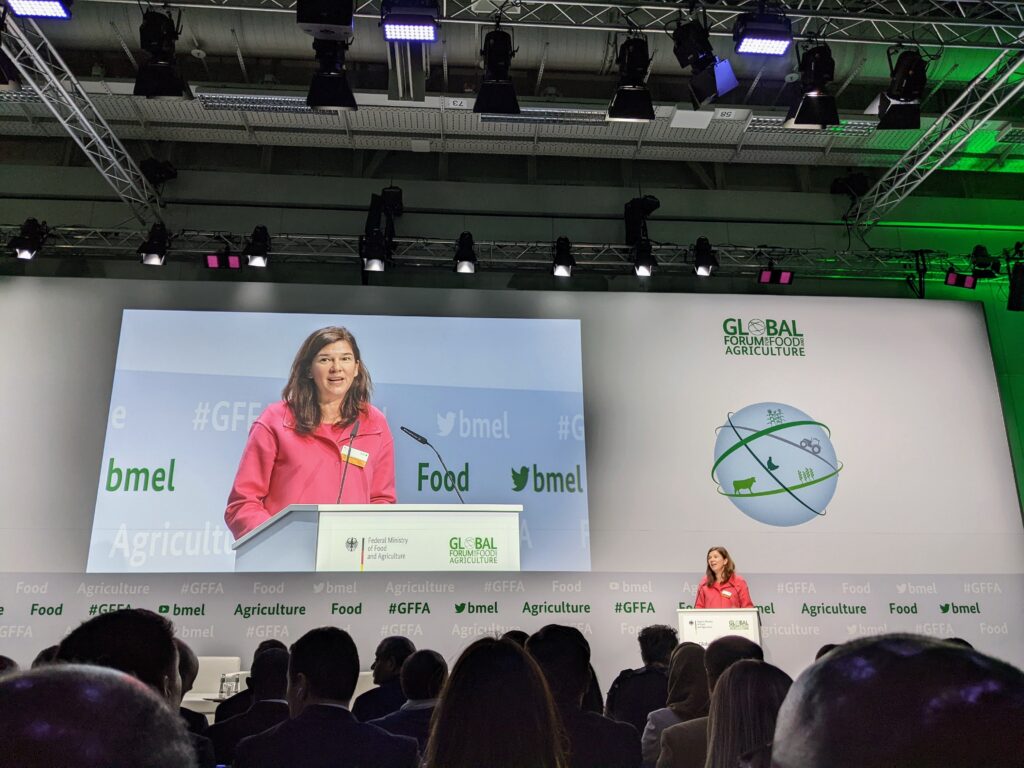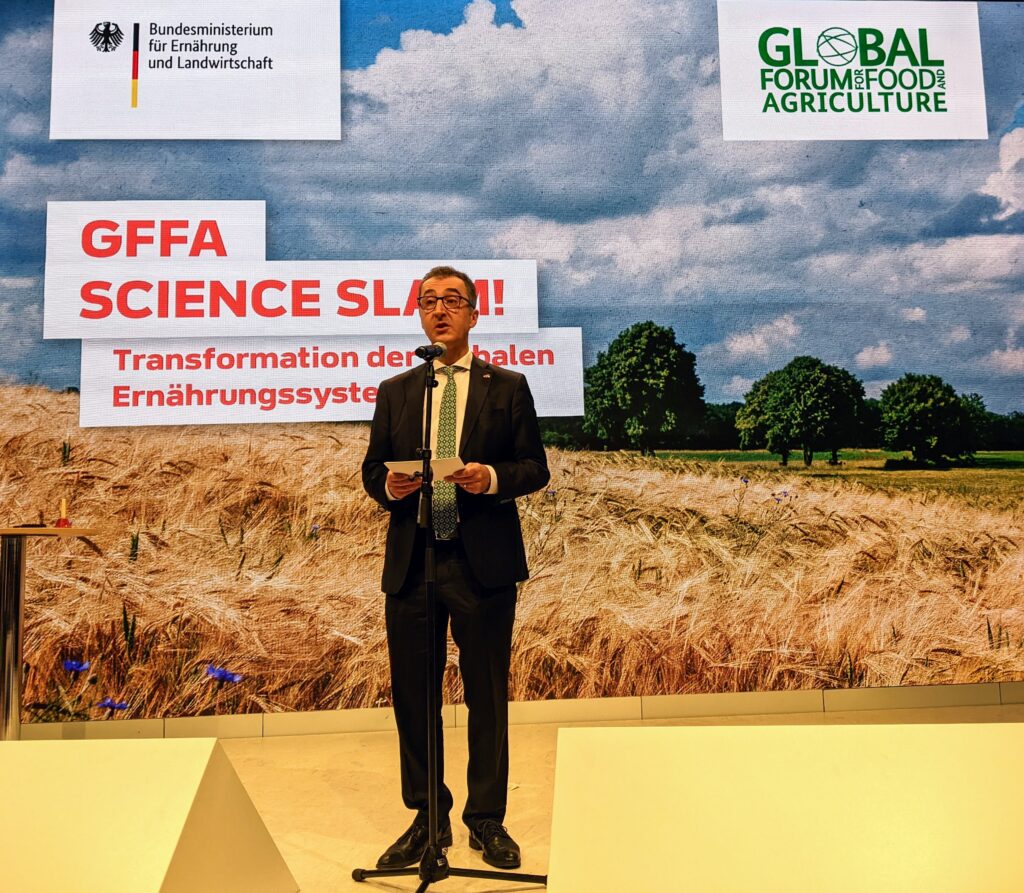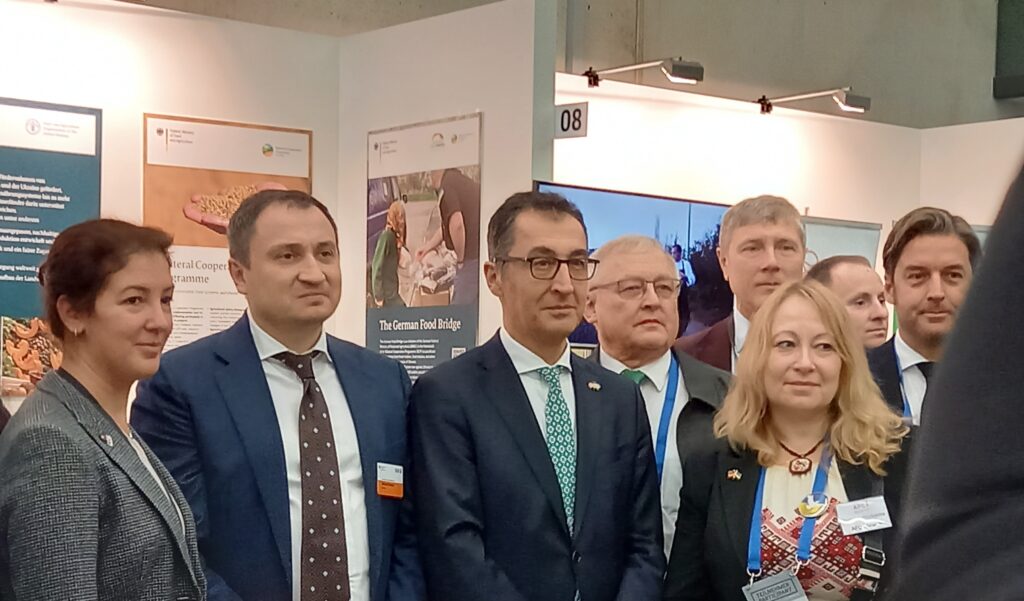On 19 and 20 January, DCZ experts Jürgen Ritter, Eva Sternfeld, and Michaela Böhme participated in the 2023 Global Forum for Food and Agriculture (GFFA) – an international conference on central issues of vital importance for global agricultural and food policies hosted annually by the Federal Ministry of Food and Agriculture (BMEL) in conjunction with the International Green Week (IGW) in Berlin, Germany. Under the motto “Food Systems Transformation: A Worldwide Response to Multiple Crises” the event brought together experts and policy makers from around the world to jointly develop a path forward towards realizing the United Nations’ goal of creating sustainable and resilient food systems needed to implement the right to food and achieve zero hunger by 2030.
Realizing the right to food
For the German government, food is a human right, parliamentary state secretary of the German Ministry of Food and Agriculture, Ophelia Nick, highlighted in her welcome address at the forum. Yet, despite the global community’s pledge to realize the right to adequate food by 2030, the number of people suffering from hunger has been increasing worldwide. Our food systems are broken, Ms. Nick stressed at the conference. While hunger persists in many parts of the Global South, diseases related to over-nutrition now dominate in the Global North. Dramatic price increases for food have recently been observed everywhere, in some cases representing an acute threat to food security, while heat, drought, and soil degradation are increasingly affecting agricultural production, she warned. These developments are driven by a number of interlocking crises – from climate change to loss of biodiversity and healthy soils, global pandemics, and war and conflict – all of which further affect our ability to provide healthy, nutritious food to people worldwide.

Food systems thinking and multi-stakeholder approaches
The 2023 GFFA showed that there is now a broad consensus in science, politics, and civil society calling for food systems thinking. Rather than focusing on individual processes or stages of the food value chain, we need a transformation involving food production, distribution, trade, and consumption to address the multiple crises facing our food systems today. Whether in panels on biodiversity, nutrition, or soil health, experts stressed the interrelationship between food production, nutrition practices, health, environment, and climate. Breaking down political silos and taking a holistic view was a common theme throughout the conference.
The need for multi-level and multi-stakeholder approaches was also highlighted. Agricultural experts, policymakers, and civil society organizations must work together across multiple levels to develop solutions for jointly overcoming the multiple crises affecting people worldwide, conference participants agreed. For example, the 2021 UN Food Systems Summit and the Voluntary Guidelines on Food Systems and Nutrition of the FAO’s Committee on World Food Security were repeatedly mentioned as important milestones towards establishing a multi-actor framework that gives a voice to local communities and involves all stakeholders in policy design. Likewise, the EU Green Deal and Farm to Fork Strategy as well as Germany’s Commission on the Future of Agriculture were seen as important tools in establishing a multi-actor approach towards the transformation of our food systems.
Furthermore, the conference highlighted the role of science and innovation. In the 2023 GFFA Science Slam, young scientists in agriculture and food had the opportunity to present their research to an international audience. The topics presented at the event ranged from new innovations in aquaponics to food loss and waste initiatives, the role of insects in food production, the water-energy-food nexus, and the transformation towards equitable food systems to prevent non-communicable diseases related to unhealthy diets.

Bilateral cooperation projects a key policy tool to drive the transformation towards sustainable food systems
The Bilateral Cooperation Programme (BCP) of the BMEL – the institutional framework in which the Sino-German Agriculture Centre (DCZ) is implemented – is an important instrument for the German government to achieve the sustainable transformation of agriculture and food systems worldwide. At a special event at the sidelines of GFFA dedicated to cross-country cooperation in agriculture via the BCP, representatives of the Federal Ministry of Food and Agriculture highlighted how the BCP framework can help to jointly develop solutions to the multiple crises facing our food systems today. From the perspective of the BMEL, important themes to be tackled in the various cooperation projects include
- food sovereignty
- organic farming and animal welfare
- rules-based trading system
- sustainable value chains
Other essential features of cooperation involve in-depth technical exchanges between experts across national borders, a multi-stakeholder approach involving partners from government, science, and civil society, as well as a close alignment of all projects with broader food security, climate, and environmental goals.
Following the BCP event, the DCZ together with other bilateral cooperation projects presented practical examples from their work within their partner countries at the GFFA Innovation Forum.





